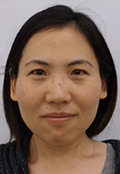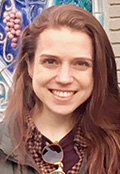2019 Award and Grant Recipients
Below are brief biographies for American Skin Association's 2019 grantees. Among the information included is the title of the grant, the name of the sponsoring institution and the focus of the grant recipient's research.
-

Roger S. Lo, MD, PhD
2018 – 2020 Abby S. and Howard P. Milstein Innovation Award for Melanoma/Non-Melanoma Skin Cancer Research (MIA)
David Geffen School of Medicine at UCLADr. Lo works in the field of cancer genetics and genomics, using next generation sequencing approaches to uncover the basis of resistance to both molecularly targeted therapies and immune checkpoint inhibitors. His lab has focused on how BRAF-mutant melanomas acquire late resistance to inhibitors, including how cell signaling, epigenetic reprogramming, melanoma cell dormancy and melanoma phenotypic plasticity may regulate resistance. The drive of his research is to uncover new therapeutic opportunities that can directly tested in clinical trials. Dr. Lo’s research has been supported by the NIH and by all of the major funders of melanoma research including the American Skin Association and the Dermatology Foundation. He has published his findings in top-tier journals such as Cell, Nature and Science, among others. It is clear that support of Dr. Lo’s research will push forward the development of novel therapeutic approaches to melanoma.
-

Hao Chang, PhD
2019 Daneen & Charles Stiefel Investigative Scientist Award for Melanoma Research
Department of Dermatology at University of Wisconsin-Madison
Topic: Dual Role of Frizzled 7 in Melanoma Development and ProgressionHao Chang, PhD earned his undergraduate degree at Shanghai Medical University in China. Upon completing his PhD studies in the laboratory of Dr. Richard Behringer at the University of Texas - Health Science Center at Houston, he did his postdoctoral training in the laboratory of Dr. Jeremy Nathans at Johns Hopkins University. Dr. Chang is currently an Assistant Professor in the Department of Dermatology at the University of Wisconsin-Madison. Research in his laboratory focuses on characterizing the role of Frizzled receptors in skin development and disease, especially melanoma.
-

Willy Hugo, PhD
2019 Daneen & Charles Stiefel Investigative Scientist Award for Melanoma Research
The Regents of the University of California, Los Angeles
Topic: Single-Cell Analysis of Gene networks Driving Immunotherapy Resistance in MelanomaWilly Hugo, PhD is a currently an Assistant Adjunct Professor at the Division of Dermatology, UCLA School of Medicine. He earned his PhD in Computational Biology from the National University of Singapore in 2011 and had since published multiple high impact papers on the mechanisms of resistance and immunotherapy in melanoma. Currently, Dr. Hugo is studying genes and pathways affecting melanoma's sensitivity and resistance toward targeted- and immunotherapies at single-cell level. He is hopeful that his work will translate to novel treatment avenues for melanoma patients.
-

Neda Nikbakht, MD, PhD
2019 Milstein Research Scholar Award in Melanoma/Non-Melanoma Skin Cancer
Thomas Jefferson University
Topic: Genomic Profiling of Early Stage Cutaneous T-Cell LymphomaNeda Nikbakht, MD, PhD, is an Assistant Professor of Dermatology at Thomas Jefferson University. She serves as the Director of Cutaneous Lymphoma Clinic at Jefferson and her research is focused on understanding the mechanisms of cancer formation and progression in cutaneous T cell lymphoma (CTCL). Dr. Nikbakht earned her PhD in Immunology and her medical degree from Jefferson Medical College. Her graduate work centered on cell-cell interactions and homeostatic mechanisms regulating lymphocyte survival and proliferation. Her post-graduate research at Sidney Kimmel Cancer Center focused on anti-tumor T cell responses and epigenetic anticancer therapies. Moving forward, her long-term objective is to integrate clinical management of CTCL patients with development of a translational and basic research program focused on CTCL.
-

John Harris, MD, PhD
2019 Calder Research Scholar Award in Vitiligo
University of Massachusetts Medical School
Topic: CCl5-Induced Clustering of T-Cells Modulates Vitiligo ProgressionJohn Harris, MD, PhD, is a tenured Associate Professor of Dermatology at the University of Massachusetts Medical School (UMMS) in Worcester, MA. He serves as Director of the Vitiligo Clinic and Research Center at UMMS, focusing both on the clinical management of vitiligo patients as well as research into new therapeutic strategies. His approach includes basic, translational, and clinical studies that incorporate the use of mouse models, human tissues, and small clinical trials that determine disease mechanisms of vitiligo, identify quantifiable markers of disease activity, and test new treatments. Previous work from his research team revealed that the IFN- signaling pathway is central to both the progression and maintenance of vitiligo, and recent studies in both mice and humans have demonstrated efficacy of new immunotherapies that target this pathway. More recent data determined that IL-15 promotes maintenance of the disease, and targeting IL-15 signaling may prove to be a new, even durable, treatment strategy. Ongoing research seeks to better characterize the mechanism of action of these new treatments and to identify new targets in order to design an optimal therapeutic strategy for vitiligo patients, who currently have no FDA-approved treatment options. Long-term goals are to bring new treatments with better safety and efficacy into the clinic and ultimately to find a cure for this psychologically devastating disease.
-

Xiying Fan, PhD
2019 ASA Research Scholar Award
University of Colorado Anschutz Medical Campus
Topic: A Novel Mouse Model for Visualizing Cancer Development and Immune EvasionXiying Fan, PhD is a Research Instructor in the Department of Dermatology at the University of Colorado Anschutz Medical Campus. Dr. Fan received her PhD degree from the Chinese Academy of Sciences. She then finished her postdoc training with Dr. Rui Yi at the University of Colorado Boulder where she studied skin development from the earliest stages. Currently, she is a Research Instructor with Dr. Dennis Roop. She is currently focusing on cancer immunology in cutaneous squamous cell carcinoma.
-

Elena Bernardis, PhD
2019 Research Grant for Childhood Skin Diseases/Disfigurement
University of Pennsylvania
Topic: Quantifying Alopecia Variations from Images via Artificial IntelligenceElena Bernardis, PhD is a Research Assistant Professor in the Department of Dermatology at the University of Pennsylvania. Her research lies at the intersection of computer vision and medical image analysis, with particular interest in microscopic image analysis and computational dermatology. Dr. Bernardis received her PhD at the University of Pennsylvania in Computer and Information Science and is also an alumnus of the General Robotics, Automation, Sensing and Perception (GRASP) Laboratory. Before joining the Penn Dermatology faculty, she completed her training as a post-doctoral fellow in the Section of Biomedical Image Analysis in the Department of Radiology, and spent four years as a Research Associate in the Section of Dermatology at the Children's Hospital of Philadelphia working on acne and alopecia.
-

Sarah Whitley, MD, PhD
2019 Research Grant for Psoriasis/Inflammatory Skin Diseases
University of Pittsburgh
Topic: IL-23 Regulates Cutaneous Resident Memory T Cell DevelopmentSarah Whitley, MD, PhD, is an early career investigator currently pursuing post-doctoral research training in the laboratory of Daniel H. Kaplan, MD, PhD, where her work seeks to understand the interplay of innate and adaptive immune cell types in orchestrating host protective Th17 immunity that also is pathogenic in some instances. She practices general dermatology at the University of Pittsburgh Medical Center; her clinical interests are inflammatory skin diseases and cutaneous infections. Dr. Whitley completed her B.S. in Microbiology at the University of Michigan and MD & PhD in Immunology as part of the Medical Scientist Training Program (MSTP) at the University of Alabama at Birmingham followed by dermatology residency at the University of Pittsburgh. Her graduate work in Dr. Casey Weaver’s lab focused on mechanisms that control the development and function of the Th17 effector CD4 lineage. Her current research project focuses on defining the role of IL-23 in supporting cutaneous Th17 tissue resident memory cell development and maintenance.
-

Rebecca Hartman, MD, MPH
2019 Research Grant for Quality of Life/Health Services/Outcome Studies
Brigham and Women’s Hospital
Topic: The Role of Inflammation in Melanoma Risk – Does Sex Matter?Dr. Hartman is an Instructor of Dermatology at Brigham and Women’s Hospital and Harvard Medical School. She received her medical degree (MD) from the University of Pennsylvania School of Medicine and her MPH degree from the Harvard School of Public Health. She completed her internship at Brigham and Women’s Hospital followed by dermatology residency at Harvard Medical School. Dr. Hartman is a clinician-researcher conducting epidemiological and health services research in the areas of melanoma and keratinocyte carcinoma.
-

Markus Schober, PhD
2019 Research Grant for Skin Cancer and Melanoma
New York University School of Medicine
Topic: Defining AMIGO2 Function in Chemotherapy Resistance and Squamous Cell Carcinoma ProgressionMarkus Schober, PhD is an Assistant Professor in the Ronald O. Perelman Department of Dermatology at New York University School of Medicine. Dr. Schober trained with Dr. Juergen Knoblich at the Institute for Molecular Pathology in Vienna, with Dr. Norbert Perrimon at Harvard Medical School, and with Dr. Elaine Fuchs at Rockefeller University before he joined the faculty at NYU. His research focuses on the transcriptional control of self-renewal and differentiation as well as chemotherapy resistance in squamous cell carcinomas. His laboratory identified squamous cell carcinoma cells with tumor propagating potential, defined a molecular signature that distinguishes these cells from normal skin epithelial stem and progenitor cells, discovered a cancer specific transcriptional network that governs self-renewal and squamous differentiation, and linked TGFβ regulated quiescence to chemotherapy resistance in mouse and human squamous cell carcinoma models.
-

Rupali Gund, PhD
2019 ASA Mulvaney Family Foundation Research Grant for Vitiligo and Pigment Cell Disorders
Columbia University Medical Center
Topic: Role of Syntaxin17 in Melanosome Maturation and Alopecia Areata PathogenesisRupali Gund, PhD is a postdoctoral research scientist in the Department of Dermatology at Columbia University Medical Center in New York. After obtaining her PhD degree in Immunology at the National Insitute of Immunology in India (2014), Dr. Gund briefly worked in the cancer-therapeutic industry before joining the laboratory of Dr. Colin Jamora in the Institute for Stem Cell Biology and Regenerative Medicine in Bangalore, India (2014-2017), where her research identified the novel interactions between skin-resident 𝛾𝛿+T cells and hair follicle stem cells that promote tissue regeneration during the skin wound repair. Her current research focuses on understanding the role of autophagy and immune pathways involved in the hair biology and pathogenesis of autoimmune alopecia in the laboratory of Dr. Angela Christiano.
-

Catherine Baker
2019 Hambrick Medical Student Grant Targeting Melanoma & Skin Cancer Research
Geisel School of Medicine at Dartmouth
Topic: CRISPR-Cas Genome Editing for Cutaneous OncovirusesCatherine is a fourth-year medical student at the Geisel School of Medicine at Dartmouth. She is pursuing a research year with Dr. Matthew Hayden in the section of Dermatology at Dartmouth-Hitchcock Medical Center. Her current research is centered on the use of CRISPR-Cas enzymes to target the cutaneous oncoviruses that cause skin cancer, such as Human T-Cell Leukemia Virus Type 1 (HTLV-1) and Human Papillomavirus.
-

Jamie Hu
2019 Hambrick Medical Student Grant Targeting Melanoma & Skin Cancer Research
Yale School of Medicine
Topic: Biodegradable Bioadhesive Nanoparticle (BNP) Drug Delivery in the Treatment of SCCJamie Hu is a fourth-year medical student at the Yale School of Medicine. She graduated from Cornell University with a Bachelor’s degree in Biology and German Studies. She is currently pursuing a research year in the Department of Dermatology at the Yale School of Medicine with Dr. Michael Girardi. Her research focuses on harnessing biodegradable, bioadherent nanotechnology for the local, nonsurgical treatment of cutaneous malignancy. She is originally from Wellesley, Massachusetts.
-

Jihoon Lee
2019 Hambrick Medical Student Grant
University of Washington
Topic: CRISPR-Cas9-Based Epigenome Editing to Inhibit Skin CancerJihoon William Lee is a third-year MD-PhD student at the University of Washington. He earned a Bachelor of Science degree with Honors in Bioengineering at the California Institute of Technology (Caltech). As an undergraduate at Caltech, he started to build a background in cancer biology and translational research, which he hopes to continue long-term in his medical career. He is now pursuing research in the Kawasumi Laboratory at University of Washington Dermatology, creating targeted epigenome editing technologies to upregulate tumor suppressors in order to inhibit transformation and progression of skin cancers. Jihoon has spent his life in Korea, New Jersey, Washington, and California.
-

Alicia Mizes
2019 Hambrick Medical Student Grant Targeting Melanoma & Skin Cancer Research
University of Pittsburgh
Topic: Novel Intratumoral Delivery of Chemotherapies for the Immunotherapy of Cutaneous NeoplasmsAlicia Mizes is a second-year medical student at the University of Pittsburgh School of Medicine. She is participating in a research year through the UPSOM Physician Scientist Training Program in Dr. Louis Falo’s lab, where she is studying the application of microneedle array based topical immunotherapy for the treatment of melanoma and squamous cell carcinoma. She received a Bachelor’s Degree in Neuroscience from Pomona College and has previously conducted research at the National Cancer Institute and City of Hope. Alicia is originally from Rochester, New York.
-

Kristina Navrazhina
2019 Hambrick Medical Student Grant Targeting Melanoma & Skin Cancer Research
Weill Cornell Medical College
Topic: The Role of AMPK Signaling in Melanoma MetastasisKristina Navrazhina is a fifth year MD-PhD student at the Weill Cornell/Rockefeller/Sloan-Kettering Tri-Institutional MD-PhD Program in NYC. She graduated summa cum laude as salutatorian from the Macaulay Honors College at Hunter College, where she studied biological sciences. Her research interests include elucidating mechanisms which allow melanoma cells to metastasize in hopes of identifying novel therapeutic interventions. Currently, she is studying metabolic adaptations in metastatic melanoma.
-

Kevin Yang
2019 Hambrick Medical Student Grant Targeting Melanoma & Skin Cancer Research
University of Alabama Birmingham
Topic: The Role of STING Agonists in UVB-Induced DNA DamageKevin Yang is a second-year medical student at the University of Alabama at Birmingham School of Medicine. He graduated from the University of Alabama at Birmingham with a Bachelor’s Degree in Molecular Biology. His undergraduate research focused on the molecular mechanisms of heart failure. His current research explores the role of the innate immune system in skin cancer. He grew up in Atlanta, Georgia and Birmingham, Alabama.
-

Zizi Yu
2019 Hambrick Medical Student Grant Targeting Melanoma & Skin Cancer Research
Harvard Medical School
Topic: : Characterizing the Role of Mast Cells in the Inflammatory Synapse of Cutaneous T Cell LymphomaZizi Yu is a third year medical student at Harvard Medical School. She graduated magna cum laude from Yale University in 2016 with a dual degree in Molecular, Cellular, Developmental Biology (MCDB) and Ethics, Politics, Economics (EPE). She is currently conducting research focusing on cutaneous T-cell lymphoma in the Department of Dermatology at Brigham and Women’s Hospital. She is originally from Woodbridge, CT.
Recipients list by year:
2024 |2023 | 2022 | 2021 | 2020 | 2019 | 2018 | 2017 | 2016 | 2015 | 2014 | 2013 | 2012




